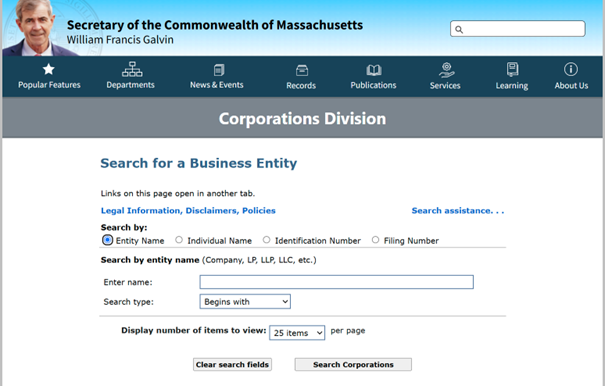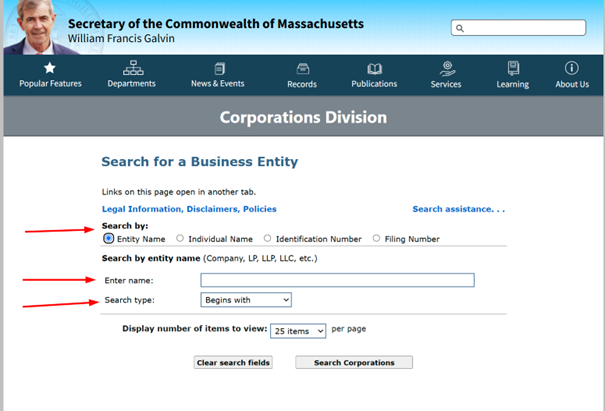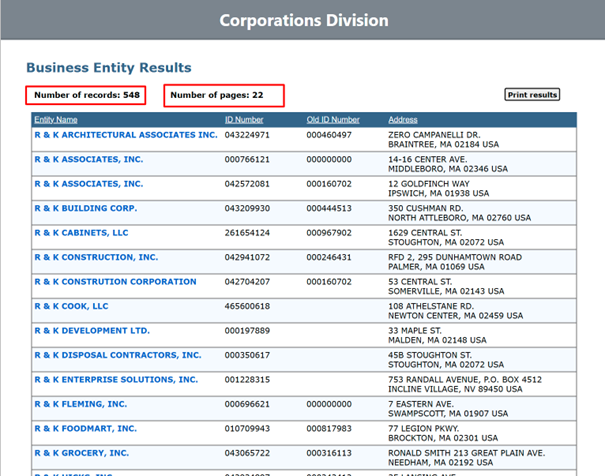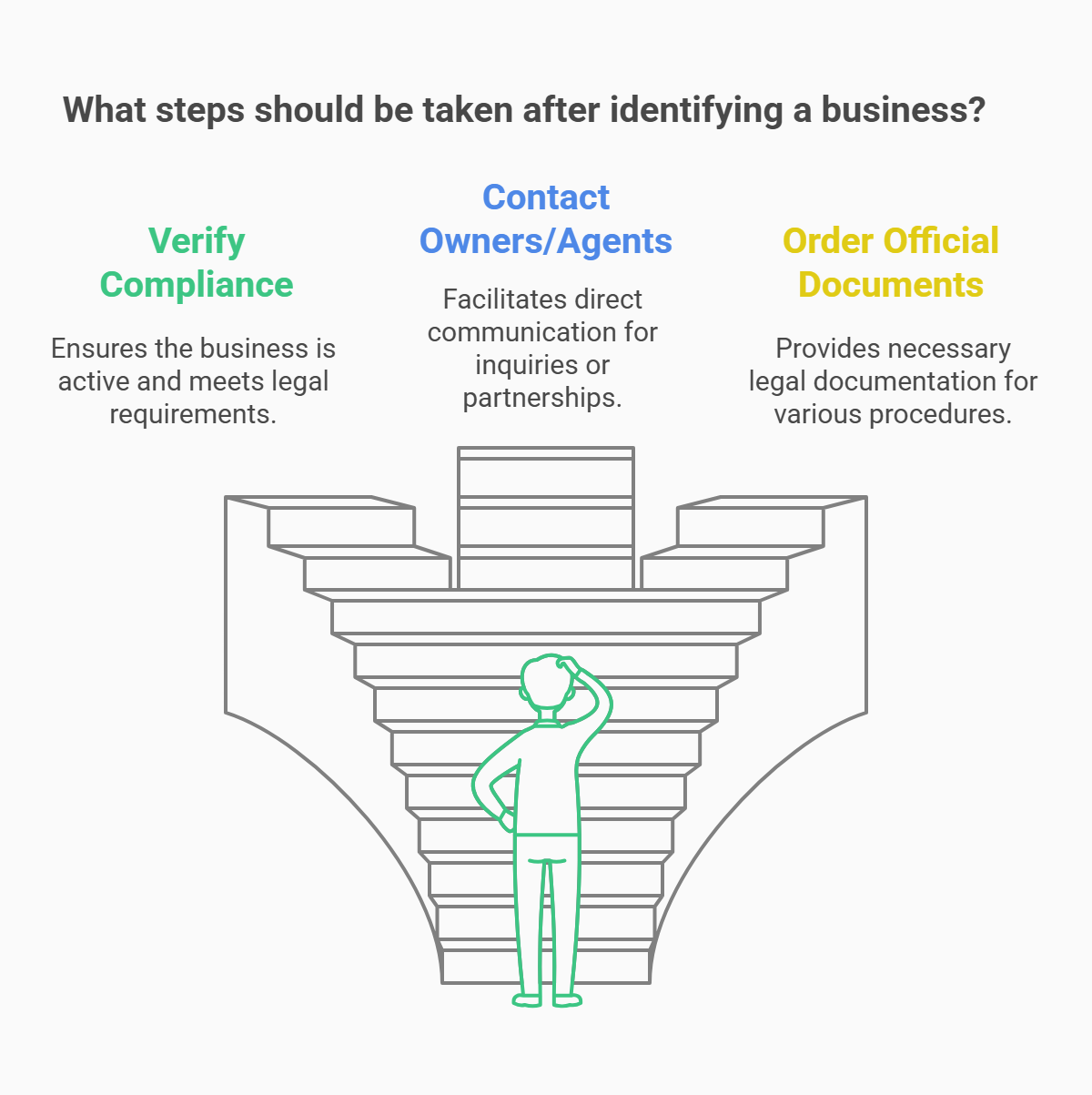Looking to confirm if a business is legit before signing a deal? Want to check if your desired LLC name is already taken in Massachusetts? Curious about a competitor’s legal status or filing history?
The Massachusetts Business Entity Search is a free online tool that lets you instantly verify if a company is registered with the state, check its current status (active, dissolved, or inactive), see formation dates, and view the registered agent or office address. Accessible via Mass.gov, this database helps entrepreneurs, investors, and legal professionals make informed decisions by offering up-to-date public records on corporations, LLCs, nonprofits, and more.
In this article, you'll discover:
- How to use the official search tool step by step
- What key business information you can uncover
- How to check name availability before forming an LLC
- Tips for avoiding misleading or outdated search results
Ready to uncover the truth about any Massachusetts-registered business? Let’s dive into how the entity search tool works and what it reveals.
Why You Need the Massachusetts Business Entity Search Tool
A quick massachusetts business entity search can reveal crucial facts about a potential partner, competitor, or supplier. In a matter of minutes, you’ll see essential data like the company’s status, formation date, and key filings. This process not only helps you confirm the legitimacy of another organization but also prevents you from inadvertently using a name that’s already taken. Having reliable, up-to-date information means making confident decisions—whether you’re launching your own venture or verifying a business for legal or financial reasons.
What It Can Tell You About Any Registered Business
By using the online search feature, you can uncover a range of details about a company. For instance:
- Official name on record
- Unique registered agent responsible for handling legal notices
- Formation date and entity standing
- Addresses associated with the business
- Past filings like amendments or dissolutions
As of March 2025, accessing these records typically incurs no direct fee, though obtaining certified copies can cost extra. Knowing these facts helps confirm that you’re dealing with a legitimate organization and offers transparency regarding the company’s legal and operational track record. It’s particularly valuable when negotiating contracts, verifying references, or exploring expansion opportunities.
When to Use It: Before Registering, Signing a Contract, or Hiring
A thorough business check is vital in several scenarios. For example:
- Forming Your Own LLC or Corporation: Searching first ensures the name isn’t in use.
- Negotiating Contracts: Confirm the other side’s legitimacy before finalizing deals.
- Hiring Vendors: Validate that service providers are truly authorized to operate.
- Mergers or Acquisitions: Get a snapshot of the target’s compliance standing.
- Protecting Intellectual Property: See if your prospective brand conflicts with another entity.
This upfront research can save time, money, and headaches by highlighting potential red flags. Missing or outdated data might indicate poor administrative practices or even a dissolved entity. Relying on official records from the business register ensures that any partnership or investment aligns with your strategic goals and risk tolerance.
What Makes the MA Business Search Different From Other States
Massachusetts offers a well-maintained online portal through the secretary of the commonwealth, providing up-to-date listings on corporations, nonprofits, and LLCs. Unlike some states that require multiple websites or third-party services, Massachusetts centralizes these records under one “Corporations Division” interface. This streamlined approach helps local entrepreneurs, legal professionals, and investors quickly search for a business and confirm vital details without sifting through scattered databases.
Found the perfect name in Massachusetts?
Form your LLC quickly with ZenBusiness starting at $0, and get expert guidance every step of the way.
Step-by-Step: How to Search a Massachusetts Business Entity
Whether you’re confirming a competitor’s legal status or finalizing your own desired llc name, the following instructions walk you through the state’s official website. By gathering the right information in advance, you’ll speed up the process and reduce confusion over partial matches or outdated records.
Step 1: Go to the Corporations Division Search Tool (Mass.gov)
Navigate to the Massachusetts Corporations Division search page on Mass.gov. Look for the link labeled “Search by Entity Name/ID” or something similar. This portal is maintained by the massachusetts secretary and houses all relevant filings for corporations, LLCs, and partnerships. The interface is designed for both public inquiries and owners checking on their own companies. Make sure you’re on the official site, not an unofficial aggregator—this ensures the data you find reflects the most current records as of 2025.

Step 2: Choose Your Search Type (Entity Name or ID Number)
Massachusetts offers various methods to perform a search:
- Name Search: Enter the entity’s legal name or part of it to see a list of matches.
- ID Search: Use the business’s unique filing number or other identification number if you have it.
- Advanced Filters: Some searches let you refine by entity type (LLC vs. Corp) or status (active or dissolved).
Opting for an ID-based lookup is often most accurate. If you only know part of the name, start broader—enter all or part of the known words—then narrow it down if you get too many hits. This method reduces the chance of missing exact matches due to minor typos.he company’s official listing. Minor typos or extra punctuation can affect your results.

Step 3: Enter the Correct Name Format (Tips to Avoid Zero Results)
When typing the name in the search, use consistent spelling and spacing. If you suspect the company might have “Inc.” or “LLC” at the end, try variants to broaden your results. Avoid extra punctuation—like parentheses or commas—that might yield no matches. If you’re uncertain about wording, you can do a partial search. For instance, if you want “Green Tree Solutions LLC,” searching for “Green Tree” could capture potential variations. Keeping it simple helps ensure you don’t accidentally skip a relevant listing due to minor naming discrepancies.
Step 4: Review Key Information (Status, Agent, Filings)
Once results appear, pick the entry that seems most relevant. The record typically displays:
- Registration status (active, dissolved, inactive)
- Physical address or principal office location
- Registered agent information
- Key filing events like formation or amendments
Confirm that you’ve located the correct llc and corporation listing by checking the date of formation or cross-referencing addresses. If you see multiple near-duplicates, compare each record’s details carefully—typos or older entries might still be on file.

Step 5: Save or Print Records (For Legal or Internal Use)
Finally, download or print the summary page for your records. Having a digital copy can prove handy if you decide to register your business in Massachusetts and need proof of name availability. This documentation also serves as evidence should you need to verify a competitor’s existence or reference the official info in contract negotiations. Keep these records in a secure folder or drive, ensuring they’re accessible for any future legal or operational requirements.
How to Check If Your Business Name Is Available in Massachusetts
Using the same portal you’d rely on for verifying existing organizations, you can also confirm if your proposed LLC or corporation name is free to use. This quick step helps avoid the hassle of re-filing or rebranding later on.
Using the Same Search Tool to Check Name Conflicts
Just like you’d check name availability in other states, Massachusetts allows you to search for a business by name. For step-by-step guidance beyond Massachusetts, here’s how to check LLC names to avoid common registration pitfalls. If the system returns no match or shows only distinct entities, that suggests your name might be open. However, watch for slight similarities; a too-similar name can cause rejection. For instance, “Optima Solutions Inc.” might conflict with “Optima Solution Consulting LLC.” Always aim for clarity to avoid confusion with all the registered companies in the state.
Understanding Naming Restrictions in Massachusetts
Under state law, you can’t choose a name that misleads the public or falsely implies government affiliation. Common rules as of March 2025 include:
- Prohibited Terms: Words like “Bank,” “University,” or “Insurance” may need special approval.
- Legal Entity Identifiers: For an limited liability company, you often must include “LLC” or “L.L.C.” in the official name.
- No Deceptive Wording: Avoid terms that suggest a different entity type than you actually are.
- Exact Match Prohibitions: If a name is already in use, you can’t simply add “The” or “Inc.” to differentiate.
Skipping these guidelines leads to rejection when you attempt to entered in their business name at registration.
Reserving Your Name If You’re Not Ready to File
If you want to hold onto a name but aren’t prepared to form your LLC right away, Massachusetts lets you reserve it for a small fee. By filing a reservation request with the secretary of the commonwealth, you guarantee that nobody else can register that name for a set period, typically 60 days. This buffer offers time to finalize your domain name, gather funding, or complete other startup tasks. If you’re still brainstorming ideas, reviewing these LLC name examples might help you choose something unique and compliant.
Need a registered agent in Massachusetts?
Northwest offers premium privacy protection, transparent pricing, and top-rated service across all 50 states.
I Found the Business I Was Looking For — Now What?
Locating the right record through the state’s secretary of state business portal is just the first step. Once you confirm the company’s identity, you might need to verify compliance, contact the owners, or obtain official documents for your due diligence or legal procedures.
How to Verify If the Business Is Active and Compliant
An active status means the company is up to date on filings, while a “good standing” label suggests they’ve met all annual or biennial requirements. If you see an unclear status, you can call or email the Corporations Division for clarification. They may confirm if any additional steps—like paying late fees—are needed to restore them to full compliance. This check is crucial before you sign any contract or invest resources into part of your business deal.
How to Contact the Registered Agent or Owner
For official inquiries, the listed registered agent is your direct point of contact. If you’re seeking more information, many owners list a physical address or other contact data in the public record. If that’s missing, you can attempt to connect through the agent, whose legal duty includes forwarding correspondence. For less formal inquiries—like a request to learn more about a potential partnership—business websites or social media profiles can supplement the official info found through the search.
When You Should Order Certified Copies or Certificates
In some legal contexts, you need more than a web screenshot. A certified copy from the secretary of the commonwealth might be essential for court proceedings, loan applications, or licensing requirements in other states like north carolina. Similarly, a Certificate of Existence (or Good Standing) confirms that the LLC or corporation is recognized and meets all compliance obligations. If you’re about to register your business in multiple jurisdictions, these official documents can streamline cross-state approvals.es. Proper dissolution also protects you from ongoing obligations or surprise liabilities.

Common Issues and How to Troubleshoot Them
Even though Massachusetts maintains a robust database, you might run into obstacles while searching. Typos, partial matches, or older entries can all complicate the process. Fortunately, most issues have straightforward fixes.
“No Results Found” – What It Really Means
Sometimes you’ll see zero matches, which doesn’t always indicate the company is unregistered. Often, a mismatch in spelling or an unused suffix like “LLC” triggers an empty list. Double-check your name in the search or try fewer terms. If you’re positive the entity should be there, use an identification number or a broader approach. There’s also a chance the business never filed in Massachusetts, which might require verifying in another state or referencing a federal database.
Similar or Duplicate Names: How to Read Between the Lines
You may see a list of near-identical results, especially if it’s a popular or generic name. In that case, focus on the associated filing number and formation date. One entity might be inactive, while another is active. If you find multiple LLCs or corporations with minimal differences, confirm addresses or contact details to ensure you’ve identified the correct one. This step helps avoid confusion when dealing with similarly named business entities.
Outdated Info or Errors in the Database: What You Can Do
The state updates records continuously, but occasional discrepancies happen if businesses don’t report changes. If you suspect an error—for instance, a domain name or address mismatch—reach out to the Corporations Division. They can clarify if the company filed an amendment or if the data is awaiting review. Meanwhile, always rely on official channels for definitive confirmation before finalizing major decisions like forming a massachusetts llc or contracting with an unverified entity.
Using the Business Search as a Competitive and Legal Tool
Employing the Massachusetts business entity search goes beyond simple name checks. It’s a strategic resource that can safeguard your interests, spur innovation, and even help you plan expansions. You can also explore how a broader business entity search works in other states to expand your due diligence process nationally. Consider how these search results might inform your broader approach:
- Competitive Analysis: Identify local players, see if they’re newly formed or well-established, and gauge their trajectory.
- Intellectual Property Safeguards: Confirm no existing firm uses a brand name that’s too close to yours.
- Legal Defense: Have evidence ready if a competitor claims you’re infringing on their business name or misrepresenting your structure.
- Cross-Referencing State Data: If you plan to operate in multiple locations—like Massachusetts and north carolina—you’ll want to compare state databases for conflicts.
- Forming Partnerships: Validate potential partners or suppliers by verifying active status and consistent filings.
By systematically entered in their business details on the official search and analyzing what you find, you can make confident decisions that respect state laws and position you for successful market entry or expansion in Massachusetts.
FAQ: Massachusetts Secretary of State Business Search
Whether you’re doing a quick name check or in-depth research, it’s common to have questions about the reliability and scope of official state databases. Below, we tackle some of the most frequent queries.
Yes. Massachusetts allows you to perform a search at no cost on the secretary of the commonwealth website. You’ll be able to see summary data for all the registered companies, from small LLCs to large corporations. However, if you need certified copies or other official paperwork, fees may apply. Most basic lookups remain entirely free, making it easy to gather preliminary facts on any local business.
The registry encompasses llc and corporation filings, plus nonprofits, partnerships, and other business entities formed or registered in Massachusetts. You can typically see historical records, including those no longer active. This comprehensive scope ensures you can identify defunct companies or reorganized structures. Keep in mind that sole proprietorships might not appear unless they’ve filed a Doing Business As (DBA) name.
According to the Corporations Division, data is updated routinely as new filings are processed. Larger updates often occur daily or weekly, depending on the volume of submissions. While the state strives for real-time accuracy, slight lags can occur if an entity just filed an amendment. Always confirm with the official system if you need the latest info—especially if you’re finalizing a major deal or about to check name availability.
Massachusetts’ system focuses on entity names and IDs, but you can sometimes locate a registered agent information through advanced search fields. If you’re seeking an owner name, that might not be directly indexed, though some owner data is in public filings. For deeper searches, you can cross-reference official documents, which often list managers or officers. Keep in mind that not all ownership structures are transparent in the search interface.
If your desired llc name appears in the results, you generally must pick something else to avoid confusion. Attempting to register a duplicate or near-duplicate name can lead to rejection. Consider slight variations that remain legally distinct yet still reflect your brand. If you’re set on that name, you might investigate if the existing entity is inactive or dissolved. In rare cases, you might negotiate rights, but typically, you’d simply choose a new, more unique name.
Looking for full-service LLC formation and compliance?
Harbor Compliance helps you register your business and stay compliant with dedicated expert support.

